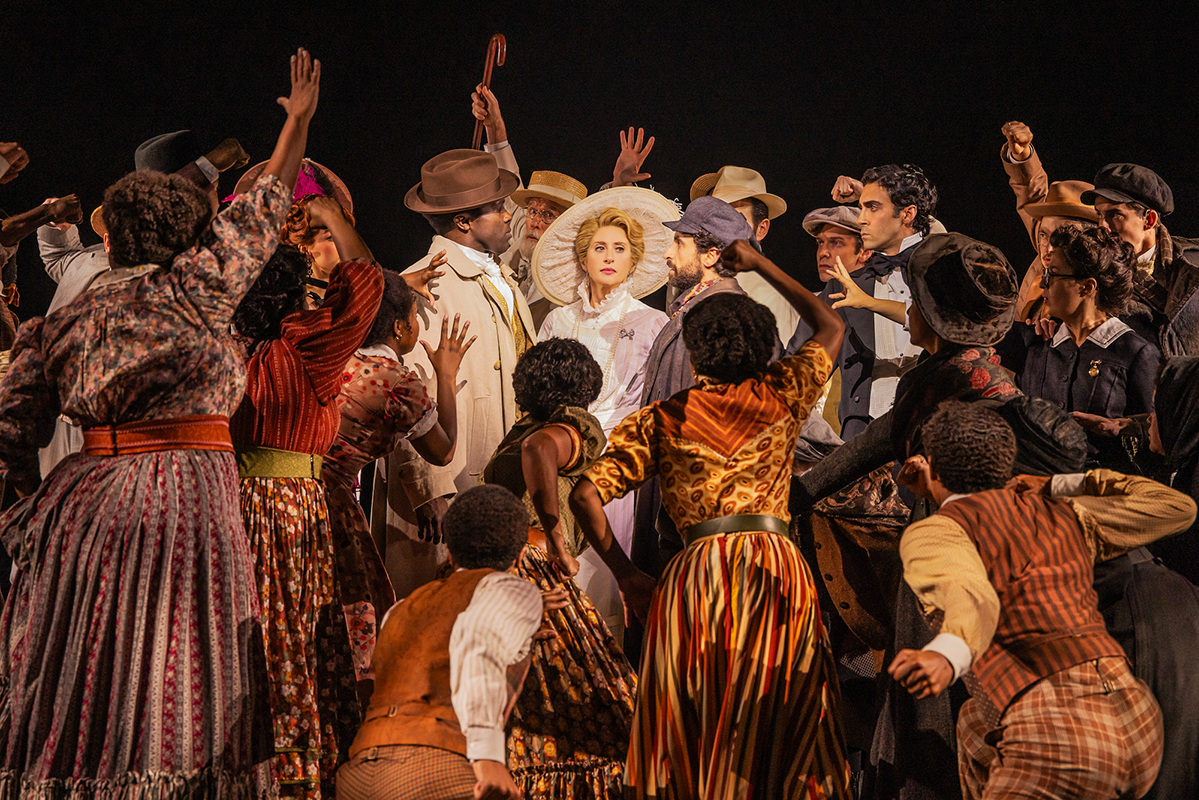Ford’s Theatre’s “Ragtime” (Review): Part musical, part melodrama, all crowd-pleaser
"Ragtime" charts a safe journey through tumultuous American history

It’s a musical. It’s a concert. It’s an Americana-themed theatrical event. It’s Ragtime, a late twentieth-century blockbuster about turn-of-the-century American history that critics declared stiff, and a lot worse, when it first debuted. Despite its Hall of Presidents renditions of several complicated, larger-than-life historical figures, it went on to garner a bevy of fans and four Tonys, including Best Original Musical Score.
Ford’s Theatre’s new production, directed by Peter Flynn, shows the 20-year old musical to be a capable workhorse that won’t necessarily set minds and hearts racing, but is sure to please. Flynn steers the titanic song machine towards an incisive, relevant interpretation, while contending with a book by notable playwright Terrence McNally (Love! Valour! Compassion!) that reduces E.L. Doctorow’s expansive novel to a CliffsNotes reading of an epic.
Fortunately, Ragtime (★★★½) boasts some great songs by composer Stephen Flaherty (Once on This Island) and lyricist Lynn Ahrens (Rocky the Musical) — like comic charmer “Crime of the Century” and heartbreaking ballad, “Your Daddy’s Son” — that deserve to be standards. Best for the sweeping score, this production has assembled generations of talented performers, including a swinging nine-piece band led on keyboards and accordion by music director Christopher Youstra. It gives life to Doctorow’s interconnected stories about three fictional families, each one representative of a distinct American experience circa 1900.
Exploring what it meant at the time to be Negro and struggling, or white and affluent, or an Eastern European Jew recently arrived in the U.S., the show poignantly reflects the different factions’ similar, or contradictory, ideas of America in ways that still resonate.
A large part of the show’s success derives from the wonderful chemistry between Jonathan Atkinson’s silky-voiced immigrant artist Tateh and Tracy Lynn Olivera as Mother of a moneyed New Rochelle family. Atkinson brings ample swagger and likability to his role, lending freshness to an Old World character. Though, for pure showmanship, practically no one onstage rivals Christopher Mueller’s amusing Harry Houdini. The other players portraying Ragtime‘s period celebrities register, to varying degrees, fully across the amusement spectrum, from Jefferson A. Russell’s uninspired Booker T. Washington, to a truly rousing performance by Rayanne Gonzales as anarchist Emma Goldman.

Kevin McAllister as smitten (fictional) musician Coalhouse Walker and Nova Y. Payton as Sarah thoroughly convince as star-crossed lovers. However, though Payton sings the ever-lovin’ blues out of ballad “Your Daddy’s Son,” neither the script nor her somewhat tame performance offer clear enough insight to answer the deeper questions posed about Sarah in Mother’s moving song “What Kind of Woman.”
Backing up the performances, every aspect of stagecraft — from the lighting and sound design to the hair and makeup — resonates as soundly as the subject matter. Wade Laboissonniere’s costumes are especially ravishing, and do a fantastic job of identifying each character with their respective tribe and milieu — a quality beautifully complemented by Michael Bobbitt’s peppy choreography.
Peppy or not, the show drags a little, weighed down by a concert-style tendency to bring soloists front and center to belt to the house, rather than to any other character onstage. And a few of the songs advance the simple plot in only the tiniest baby steps. A richly satisfying and well-acted moment between Sarah and Coalhouse is barely allowed a second to steep in that earned emotion before another, too-similar song rolls in and diminishes the moment.
The utilitarian, multi-leveled set does help keep things moving, via little more than shifts in lighting and staircases, from a huge suburban house in New Rochelle, to famed explorer Admiral Peary’s ship bound for the North Pole, and several far-flung locations in between. However, no amount of reshuffled scaffolding is able to sell this show’s version of a Harlem juke joint, which feels more like a spin around a sock-hop than a peek inside a bawdy nightclub filled with those brothers and sisters that the play’s Booker T. Washington disses as leading “less than impeccable lives.”
Of course, Ragtime — and perhaps any big-budget musical featuring a cast and crew the size of a small army — can’t afford to be too grown-up in its sensibilities. Notwithstanding a few flagrant racial epithets, this glossy survey of gritty realities skirts stirring up much offense. The political statements land with a soft touch, though the show’s portrayal of brutal conflicts related to immigration and race, such as the shooting of an unarmed innocent soul, still feel utterly and powerfully topical. Maybe Ragtime is one show this divided nation might agree to enjoy together.
Ragtime runs until May 20 at Ford’s Theatre, 511 Tenth St. NW. Tickets are $18 to $64. Call 888-616-0270, or visit fords.org.
Support Metro Weekly’s Journalism
These are challenging times for news organizations. And yet it’s crucial we stay active and provide vital resources and information to both our local readers and the world. So won’t you please take a moment and consider supporting Metro Weekly with a membership? For as little as $5 a month, you can help ensure Metro Weekly magazine and MetroWeekly.com remain free, viable resources as we provide the best, most diverse, culturally-resonant LGBTQ coverage in both the D.C. region and around the world. Memberships come with exclusive perks and discounts, your own personal digital delivery of each week’s magazine (and an archive), access to our Member's Lounge when it launches this fall, and exclusive members-only items like Metro Weekly Membership Mugs and Tote Bags! Check out all our membership levels here and please join us today!


























You must be logged in to post a comment.